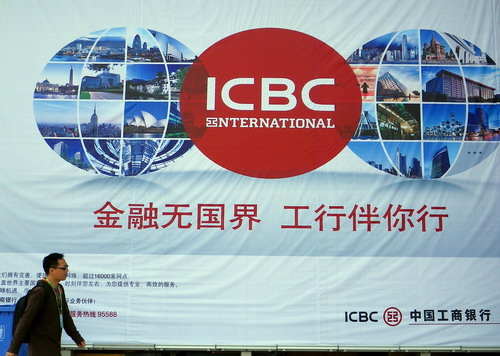Chinese satisfied with nation's banks: Poll
Updated: 2011-10-26 10:43
By Cecily Liu and Zhang Chunyan (China Daily)
|
|||||||||||
|
 An advertisement for Industrial & Commercial Bank of China Ltd in Taiyuan, the capital of Shanxi province. According to experts, Chinese banks have remained strong despite the global recession and are now expanding overseas. [Photo/China Daily] |
Lenders enjoy high public opinion compared with foreign counterparts
LONDON - Respect for banks in China remains high while the banking sector's reputation declines in the United States and the United Kingdom, a new survey has found.
The poll conducted by the Canadian research company GlobeScan found that 43 percent of 500 people surveyed in 18 Chinese cities in July had respect for their banks, compared with 18 percent in the US and 14 percent in the UK.
China's consistent economic growth has earned its banks this respect, Sam Mountford, research director of GlobeScan, said on Monday. "We know the Chinese economy is buoyant, whereas people in the US and UK have suffered over the last few years, and they're putting a lot of the blame on the actions of the banks."
New investments by Chinese banks - such as installing ATMs and establishing new offices throughout the country - have created jobs and better services and improved the sector's reputation.
"I think the Chinese people are conscious of the fact that banks have been the facilitators of the country's rapid development. Chinese families are getting rich quicker than their counterparts in the rest of the world," Mountford added.
The survey also showed that more Chinese believed that their banks fulfill social responsibilities better than other types of companies. Thirty-three percent of respondents rated banks and finance companies "among the very best" or "above average", compared with 14 percent of US and British respondents.
GlobeScan polled 500 adults in 22 countries on business and its role in society. The survey came as rating agencies have downgraded or threatened to downgrade the sovereign ratings of Spain and France and Italian banks.
The steady expansion of the Occupy Wall Street movement also is a strong indication of Western banks' waning reputation.
Scott Richie, UK managing director of BSO Network Solutions, a trading technology company, said that the Chinese have good reason to feel more confident about their banks.
"The banking structure in China is better capitalized. There is less leverage and more transparency," Richie said, adding that the high investment China attracts also boosts its banking sector's performances.
Angela Knight, chief executive of the British Bankers' Association, said that whereas the UK economy is only just starting to recover from a deep recession, Chinese banks have remained strong. "And as a consequence we notice how they are starting to be greater participants in other markets."
Industrial & Commercial Bank of China Ltd has opened five branches in Europe this year. Bank of Communications Ltd will open its first branch in San Francisco in November.
Statistics from GlobeScan also show that Chinese respondents felt less strongly about the need to increase regulation over banks than their Western counterparts.
Reg van Steen, director of business and finance at TNS, a market research consultancy, said that China has a lower level of banking regulation, but that Western markets are more prone to risks from the trading of derivatives and other financial instruments.
Many Western governments have beefed up regulation over banks following the 2008 financial crisis.
In the UK, the Financial Services Authority has seen its powers reduced, the Independent Commission on Banking has recommended a separation between High Street and riskier financial markets operations, and the Financial Services Act of 2010 required all deposit-takers to maintain their own Recovery and Resolution Plans.
Anger over unemployment, austerity, growing inequality, tax policies and opposition to the financial elite which initiated the Wall Street protests in September has generated protests in 951 cities in 82 countries and regions.
"People are just beginning to grasp the consequences of the banking failures that happened in 2008 in their own lives and their own jobs. I don't think the protests resulted from anything that happened in the last 12 months," Mountford said.
Related Stories
Banks' domestic assets, liabilities up by end of Sept 2011-10-26 10:27
Foreign banks remain optimistic over expansion in China 2011-10-20 11:26
Central Huijin buys stocks in 4 major banks 2011-10-10 16:30
China tightens rules over banks' investment products 2011-10-10 09:15
- Chinese satisfied with nation's banks: Poll
- Illegal land use gives year-end GDP boost
- Farmers, Nestle in milk payment row
- 'Inflation remains a top priority'
- Scandal-hit Wal-Mart stores reopen
- Pacific Department Store exits Beijing
- Ministry may invest social security fund
- China backs EU's efforts to tackle debt crisis










